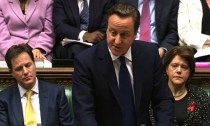 Let’s be clear about what Lord Justice Leveson recommended and did not recommend. He did not recommend statutory regulation of the press. Instead, he allowed the press to set up its own regulator. He did, however, propose that a law should be passed to create what he called a recognition body and what most of us might call an auditor, whose job would be to ensure that the regulator met some basic standards and kept to them.
Let’s be clear about what Lord Justice Leveson recommended and did not recommend. He did not recommend statutory regulation of the press. Instead, he allowed the press to set up its own regulator. He did, however, propose that a law should be passed to create what he called a recognition body and what most of us might call an auditor, whose job would be to ensure that the regulator met some basic standards and kept to them.
In other words, he placed the state at two arms‘ length from the press. The auditor, already at one arm’s length from government, would have contact only with the regulator – to ensure its processes were adequate – and never with newspapers themselves.
David Cameron seems to have rejected this auditor, because it is ‘statutory’. What that means is that he is trusting the editors and proprietors of the press to set up their own regulator, with nobody at all to judge whether that regulator will be adequate.
In doing this, Cameron is adopting exactly the approach taken by inquiries and governments in 1949, 1953, 1962, 1977 and 1990. It is the approach that gave us the Press Complaints Commission, so roundly condemned by the judge in his report, and by the prime minister. It is the option which gave us this year’s Hunt-Black plan for self-regulation, equally damned by the judge.
It is, if this needs to be said, the option that gave us the Sun’s coverage of Hillsborough, the appalling treatment of Russell Harty and Gorden Kaye two decades ago, the Motorman data mining scandal a decade ago, phone hacking, the monstering of Robert Murat, the McCanns and Christopher Jefferies. And all of the rest.
All history tells us that Cameron’s choice – despite his promises to some of the victims of those outrages – will permit more such outrages into the future. Indeed, the editors and proprietors are likely to feel that, having survived t crisis, they are untouchable
It is an option which will allow and enable the editors and proprietors to create the sort of regulator that suits them, the sort that might superficially seem credible, but that will serve the interests of the press rather than the public.
The Liberal Democrats and Labour see all of this. So do at least 40 Conservative MPs. So do all of the victims of press abuses with whom Hacked Off has dealings. And so, all the polls show, does the public.
The Liberal Democrats and Labour are meeting the Tories. Let us hope they are able to talk some sense together.
Brian Cathcart is director at Hacked Off. He tweets at @BrianCathcart.


0 Comments
1 Pingback